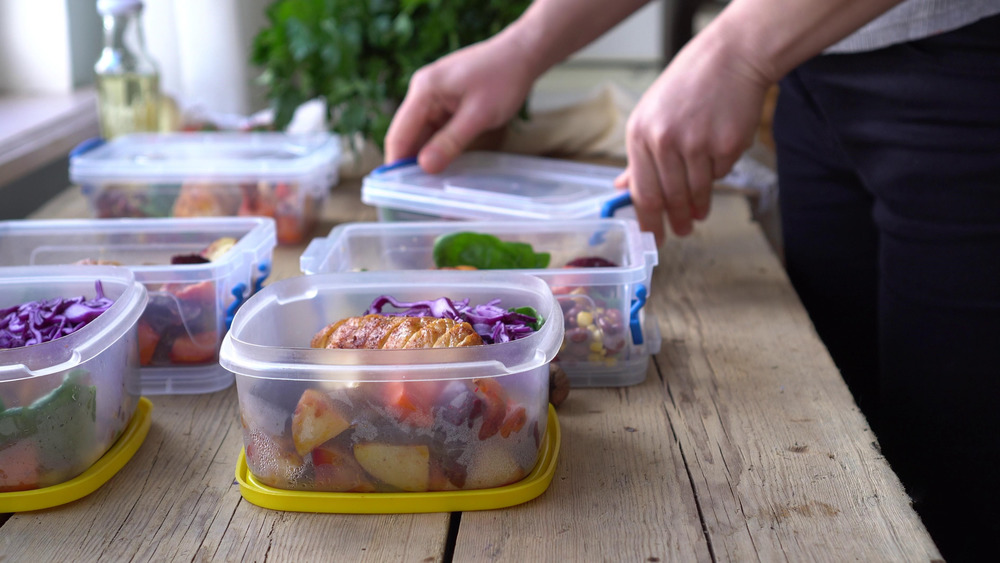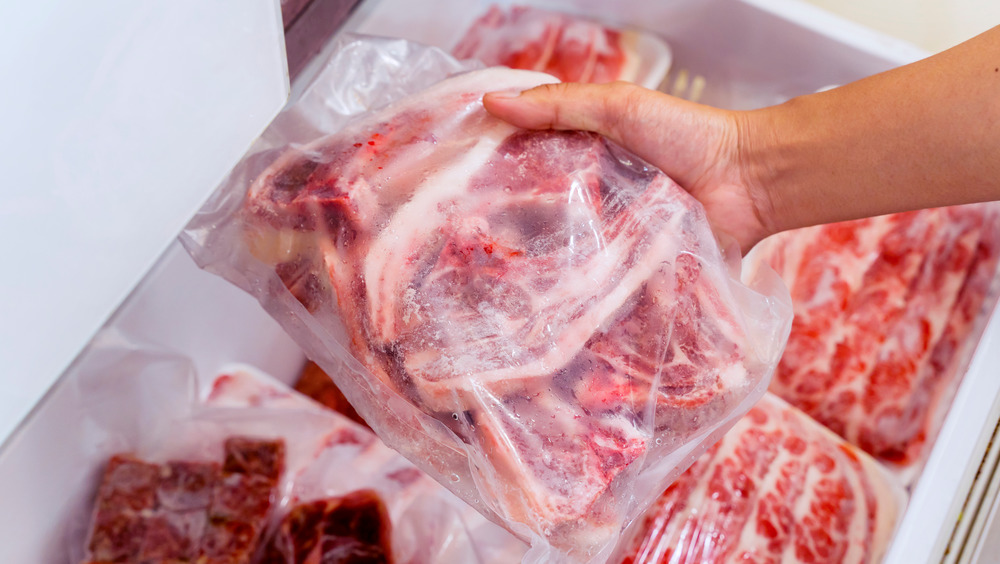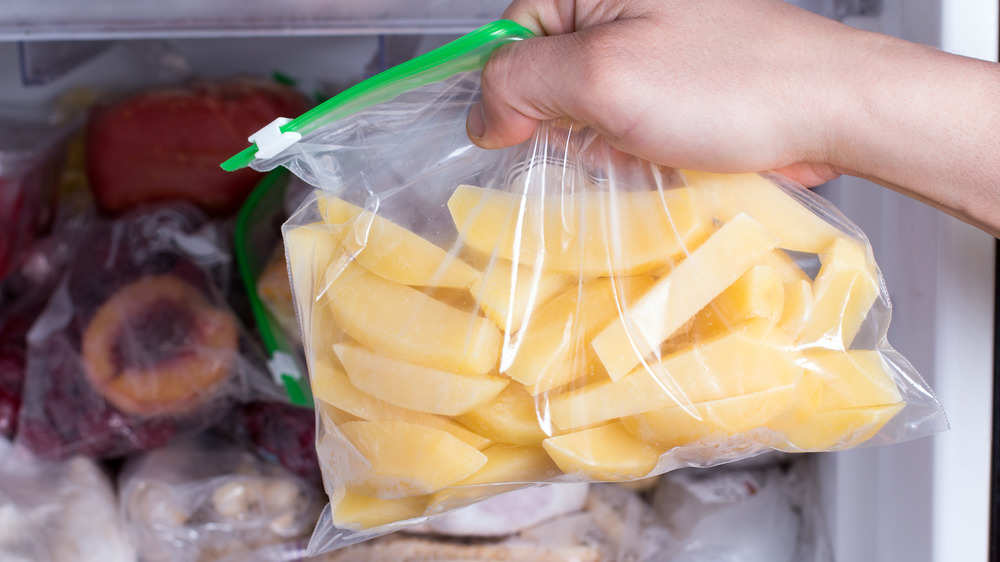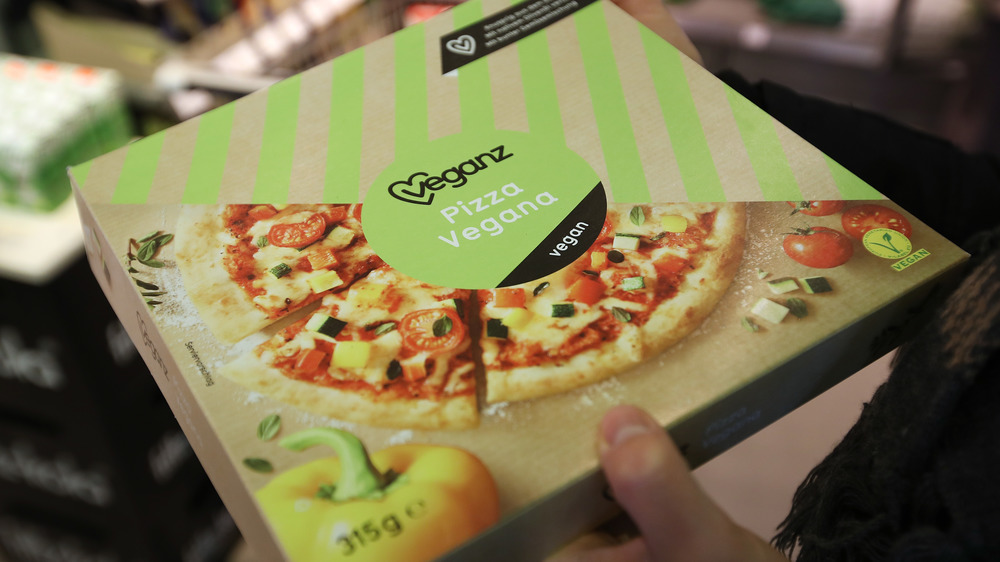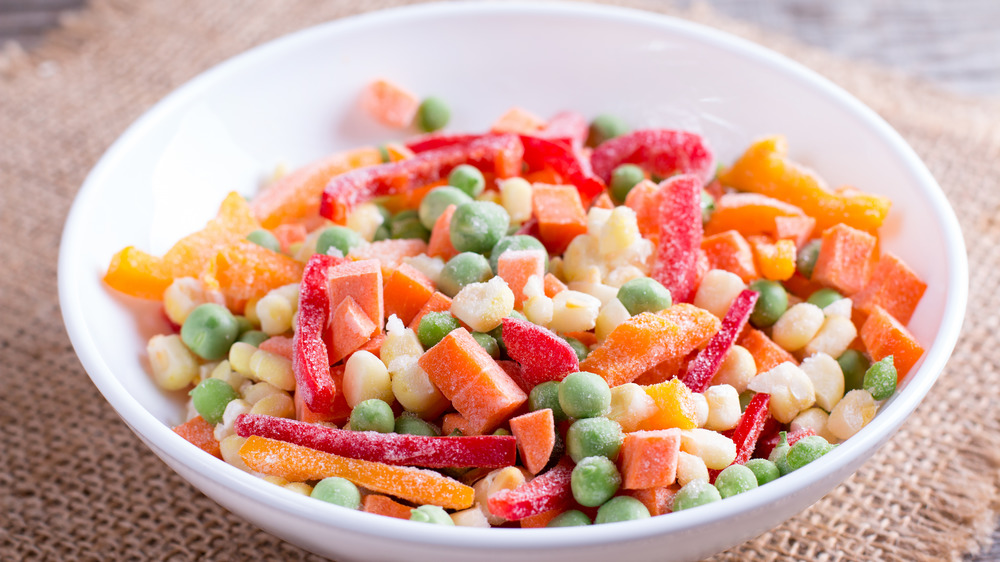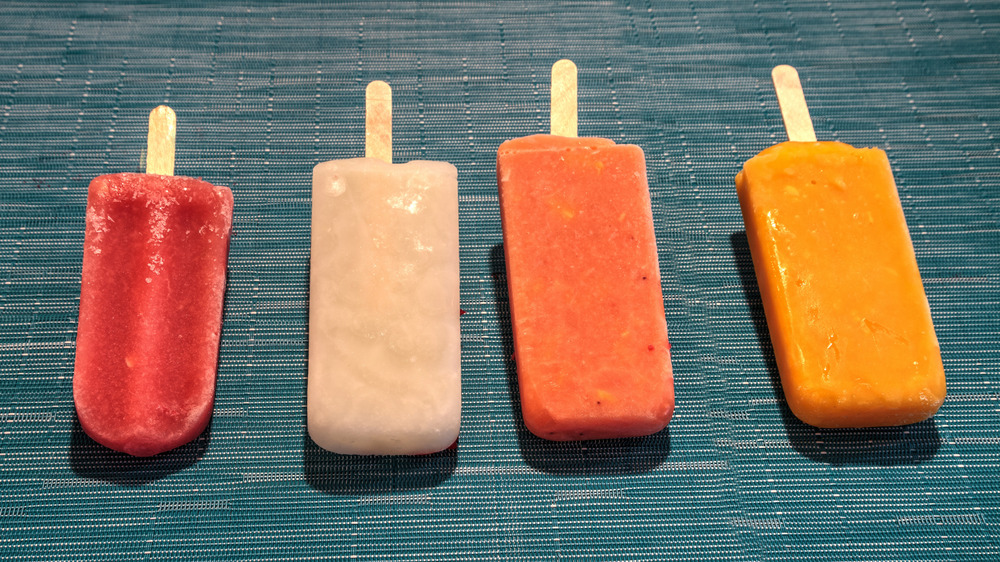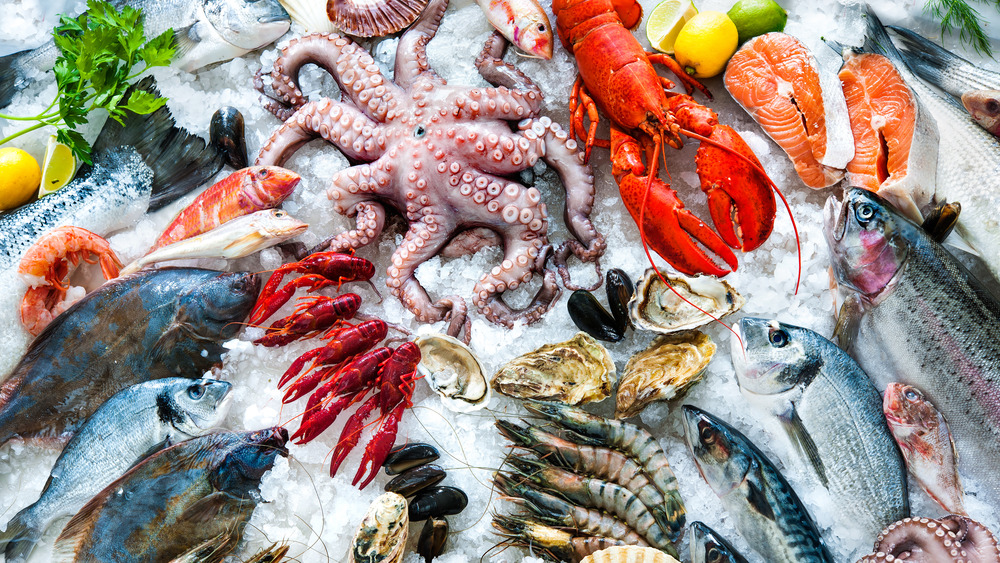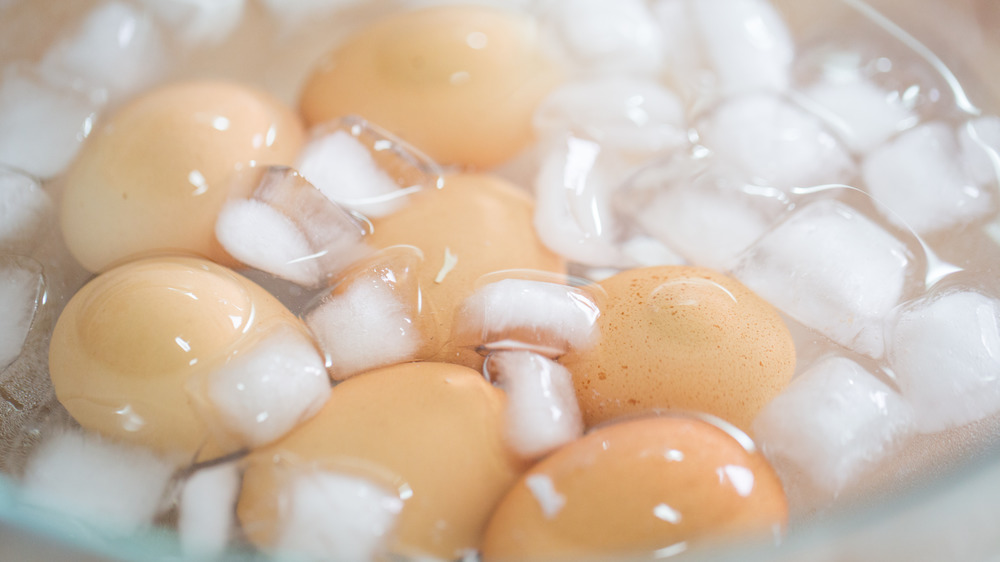Frozen Foods That Almost Never Expire
How long food lasts in the freezer is a bit of a trick question. Does food even go bad in ice-cold temperatures? Actually, the U.S. Department of Health & Human Services explains that frozen foods stored at a constant 0°Fahrenheit or below will last "indefinitely." Yes, you read that right. Most frozen foods can theoretically last forever. However, just because something won't make you ill doesn't mean we recommended eating it. How can we tell the difference?
The Kitchn claims that many foods will lose their flavor and texture after a certain time. Food can also be ruined by the dreaded freezer burn if it's packaged incorrectly. Some foods should never meet the freezer, says Spoon University, like milk, cheese, and salad greens. Meanwhile, bread lasts for three months in the freezer, according to Still Tasty, but it tends to get dry or soggy when thawed. Best to skip that move altogether and eat fresh loaves instead. Meanwhile, storing ice cream can even make you sick after more than four months in the freezer, says Kitchensanity.
How do you freeze the remaining leftovers to maintain freshness? The Kitchn recommends sucking as much air out of a freezer bag as possible, using a DIY vacuum seal to slow freezer burn and save precious space. Taking care when stocking the freezer will also help you keep foods that almost never expire. Your freezer is truly the ideal post-apocalyptic device, at least as long as electricity is still a thing.
Frozen meat
"What won't kill you makes you stronger" shouldn't be your motto when considering what's for dinner. Meat in the freezer is a particular gray area for many of us. But how long is too long? Foodsafety.gov says that fresh beef, veal, lamb, and pork can last up to 12 months in the freezer. Surprisingly, unopened packages of hot dogs, as well as lunch and deli meat, are only recommended for frozen storage up to two months, while savory salads made from macaroni, chicken, tuna, or eggs shouldn't be frozen at all.
Ultimately, Insider recommends keeping meat in the freezer to stretch the food safety window for frozen meats. You'll want to pay attention to the expiration date as the confusingly similar "sell-by date" actually has nothing to do with food safety (via USDA). But, if you have any meat that's left uneaten once you've thawed it out, it's a myth it can't go back into the freezer. TODAY show chef Jennifer Stack explains that foods kept at 40°F or below, such as frozen food thawed in the fridge or in cold water, will allow home cooks to safely refreeze anything that's left over. This means that even frozen meat doesn't have to be a source of concern for the forgetful cook. Keeping meat frozen a little past the recommended time frames might not taste good or dry out, but it is safe to eat as long as it's frozen solid.
Packages of frozen fruit
You can't believe everything you read. For instance, frozen fruit's "best-by" dates are merely a suggestion. According to EatByDate, frozen fruit is edible for 8 to 10 months past the best-by date on the package. Frostbite is the best indicator that your berries or mango have gone bad. While frostbite isn't dangerous as long as it's not happening to your own body, it's likely that frostbitten fruit will have lost much of its original flavor, resulting in a bland smoothie.
TODAY reports that bagged frozen foods shouldn't be a solid block when pulled from the cooler. This indicates that your fruit thawed and refroze at some point. If you're guilty as charged for leaving frozen foods in the car too long after grocery shopping, then you're likely familiar with this issue. Also keep a lookout for ice crystals, which shouldn't be visible on your bag of pre-packaged frozen fruit.
Smoothie lovers might also want to rethink taking their fruit straight from the freezer to the blender. The Washington Post explains that frozen fruit has been known to carry viruses. Extra cautious shoppers can microwave pre-packaged fruit to eliminate the risk. The report also reminds home cooks that food-borne illnesses don't actually die in the cold temps but growth is slowed down. The FDA says the same caution applies to only buying produce that's surrounded by ice or kept cold at the store, or even when you freeze berries yourself.
Frozen fries, tots and hash browns
Potatoes might be the perfect food for breakfast, lunch, and dinner. Potatoes are especially prized as a delicious treat that even the pickiest of eaters will enjoy. But how are you to know if a forgotten bag of tots found in the back of the freezer is safe to serve? Rest assured, the root vegetable possesses a surprisingly long shelf life. Forkly reports that potatoes as diverse as British chips and American fries are all edible for up to 12 months in the freezer. After a year, however, potatoes might lose the flavor and texture that makes the side dish (or main, we're not here to judge) so beloved.
Still Tasty recommends checking frozen potatoes for dry spots or discoloration, which is a sign of freezer burn. Checking the package for damage will also reduce the likelihood that your fries or any other potato delicacy will get ruined by the harsh environment of your freezer. How long can you safely leave frozen potatoes at room temperature? The food outlet also recommends frozen potatoes to be thrown out after more than six hours at room temperature. The Minnesota Department of Health warns that bacteria will spread in food sitting between 40°F and 140°F. Even the best barbeque will be a downer if guests flirt with food poisoning via the potato salad.
Frozen juice concentrate
Pulling a new juice concentrate from the freezer just screams of summer. It's also one of those freezer staples that can be a go-to year-round. Many parents, college students, and party hosts would agree that the ease of frozen juice concentrate is hard to beat. Remembering when you bought the can is a different challenge entirely. Forkly says that remembering when you purchased juice concentrate might be a head-scratcher, but it's not really a cause for anxiety, as home cooks can safely use the can for two years. Granted, while this block of fruit goodness is unlikely to make you sick, the food outlet admits that it's hard to say how a two-year-old can of juice concentrate will taste.
While frozen juice concentrate is safe, the Times of India wonders if it holds up to the hype of health-food status, seeing as it often contains added sugars and artificial colors. The good news is that nutrients are often added to the mix, such as calcium and magnesium. Health claims aside, the cost, simplicity, and reliability of a juice concentrate make it an enduring staple for any freezer.
Frozen pizza
Frozen pizza is a reliable dinner option to keep on hand for busy weeknights. Pre-made pizzas are also right up there with Twinkies as comfort foods that are surprisingly indestructible. Frozen pizza almost never expires, lasting up to 18 months in below-zero temperatures (via Still Tasty). It's another food that typically carries a "best if used by" date. Commercially frozen pizza manufacturers estimate how long the flavors will satisfy customers, so the best-by date is entirely a suggestion, according to the USDA.
Are you a person who loves next-day pizza as much as us? Leftover pizza bought from your favorite pizzeria also preserves well in the freezer. Popsugar found that pre-made and pan-fired pizza can be repackaged and frozen for up to two months. The outlet explains that the trick is using an airtight container, as well as double-layering the pizza with plastic wrap and tin foil to protect your precious pizza from damage. Otherwise, they found freezer burn can quickly zap the taste and texture. Adding fresh cheese once the pizza is thawed helps to jazz up the cold-treated meal, Popsugar says. Our recommendation is to heat the slices in an oven or toaster oven to add just the right amount of crunch.
Frozen vegetables
Fresh foods are a helpful addition to any balanced diet, but remembering to eat all your produce before it goes bad can be a big problem. It's especially troubling when over one-third of our food is ending up in the trash (via Spoon University). It's especially egregious when food gets wasted for the ephemeral joy of TikTok approval, as Eater reports.
Frozen veggies can be a better way to preserve produce that's delicious but not the first that comes to your mind when you're questing about for a late-night snack. They're also reliably healthier than canned veggies. According to The Spruce Eats, vegetables will last from three months for tomatoes or peppers in the freezer and up to one year for store-bought frozen options. The outlet recommends blanching leafy greens and pureeing produce with a lot of moisture.
EatingWell argues that frozen foods are cost-effective and help to avoid vegetables being picked before they're ripe or unavailable during the winter. You don't also have to trade convenience for nutrition. A study in the Journal of Food Composition and Analysis found frozen produce can even preserve nutrients better than fresh vegetables sitting in the fridge. The study points to cauliflower, corn, spinach, and broccoli as excellent frozen alternatives to fresh ones rolling around in the crisper for too long.
Variety is, well, the variety of life. Alternating between fresh and frozen can likewise help to balance both cost and the healthiest options available.
Frozen TV dinners
Long-lasting frozen meals are making a comeback. Smithsonian Magazine reports that shoppers in the U.S. are buying close to 50 percent more frozen dinners in April of 2020 than the year prior. The magazine explains that the microwave TV dinners we know today were popularized in the 1980s by Campbell Soup Company. Quick, easy, and cost-effective, the frozen TV dinner was and still is an innovation that makes dinner time a breeze. Some frozen meals are even genuinely good.
Simple portion-controlled meals might not be known as delicacies, but they're built to last. Well+Good explains frozen meals experience extra shelf life due to the innovation of Individual Quick Freezing designed to withstand freezer burn and preserve nutrients. It's easy to see why people could be confused about expiration dates or push the limits of frozen meals.
A Bon Appetit writer detailed how he accidentally ate a Salisbury steak expired Swanson TV dinner that was 15 years old. The writer found the meal complete with mashed potatoes and apple cobbler pretty good, other than soggy apples. Not bad, especially considering the distinct lack of food poisoning.
Popsicles
Popsicles are something that is always great to have in the freezer. Ever wonder why they taste so good, besides the high sugar content? It's because commercial popsicles are flash-frozen, says Mental Floss, a process that helps to retain the flavor throughout the entire popsicle. Homemade popsicles might not have the same taste, however. Mental Floss found that, due to the slower cool-down period needed for homemade popsicles, the sugars and flavors in the mix are more likely to separate. That means the inside of the popsicle could be rather bland. Turns out, sometimes it really is better to go store-bought.
Fortunately, the fruity frozen treat stays fresh for year-round snacks. Forkly reports that your freezer pops are best eaten in about six or eight months. The food experts at Forkly also recommend checking the pops for a gummy texture or ice crystals. That's how you'll know they've gone off. They also advise ensuring that the cold temps stay constant, like any good freezer, to avoid any disastrous thawing. How can the frozen pops stay cold in transit while grocery shopping? It's as simple as picking up the frozen items last and putting them away first as soon as you return home.
Seafood
Seafood is a great delicacy for many tables but has its own time table for freshness. Shellfish, like seafood, also keeps in a different way compared to other meats. Making sure seafood and shellfish are kept at safe temperatures and served fresh is therefore super important, to say the least. Fresh fish only last about two days in the fridge, says The Kitchn, so freezing seafood is a safer option than letting it accumulate pathogens at a lower fridge temperature. Anyway, there's nothing quite like the smell of stinky fish to ruin a perfectly good fridge.
Forkly reports lean frozen fish will keep for six months while oily fish preserves for two to three months if it doesn't thaw. The outlet also found shrimp can stay in a freezer for nine months at peak freshness. Erring on the side of caution, shellfish should stay edible for about three months when kept properly in the freezer (via Washington State Department of Health). Always keep seafood cold, in airtight containers and thaw them in cold water. Again, seafood will last longer in the freezer than practically anywhere else. If you're spending the money on good seafood, it might as well be as tasty and as safe as possible.
Butter
Frankly, dairy products can be hit or miss when it comes to the freezer. Cheese enthusiasts at the Independent tell you to shred your gouda before putting it in the freezer, but they recommend holding off on the creamier varieties due to the separation of fats and liquids caused by the freezing process. Meanwhile, Spoon University reports that milk is best when it's served fresh and kept away from the frozen section. Also, butter doesn't go bad when left at room temperature as quickly as you might expect. Bon Appetit says that you don't need to worry about butter too much, and also that salted butter is the best for spreadability when left in a dish or airtight French butter keeper.
Freezing butter is also an option if you're really worried about creating some additional longevity. Butter can last for up to a year in the freezer, Bon Appetit reports. They warn to watch for crystals forming on the dairy product. Freezer burn is always the enemy of fresh foods, but a home chef knows less food waste is worth the effort. To maintain some butter with the spread factor, Bon Appetit recommends keeping one stick in the freezer and one on the counter. With that sort of taste right at your fingertips anyway, who doesn't strive for toast on demand?
Spaghetti sauce
Is it a sacrilege to a true Italian-food enthusiast to freeze homemade spaghetti sauce? Maybe. Is it a convenience when feeding a family and living a full life? Yes, it sure is. It's a commonly accepted fact that cooking meals in large batches will help to save time when feeding a household. The freezer is the perfect way to ensure all that hard work doesn't go to waste, especially with homemade additions like tomato sauce. Taste of Home recommends first cooling any tomato sauces but leaving the sauce out less than two hours to prevent spoiling at room temperature. The outlet also recommends leaving space in each freezer-safe container before putting it into the freezer, as the sauce will definitely expand as it freezes.
If the sauce is taking longer than two hours to cool, Food Network says to put the sauce into the fridge until it reaches around 45°F. The sauce can be kept in small portions in plastic freezer bags or even ice cube trays, according to Food Network. They don't recommend glass containers in case the expansion of the sauce causes it to shatter. If packed correctly, the Food Network says tomato sauce can stay delicious for up to six months. Longer than that risks freezer burn or a lackluster flavor.
Eggs
Eggs might not be the first thing you think of when it comes to preserving frozen food. Fortunately, it can be a great option when you have too many eggs and need to leave town. What you can't do is freeze a whole egg, as the shells will crack. Thankfully, MyRecipes has a solution. The outlet debunked the myth of the incredible inedible frozen egg by recommending you first whisk, then freeze eggs. You can also freeze eggs that have been beaten and then use them later to make omelets or baked goods. You might want to take note somewhere about how many eggs you used if baking. Egg whites are also freezer friendly, MyRecipes says, but egg yolks aren't due to some texture issues that might result.
The Prairie Homestead found that you can preserve the whole egg longer by rubbing the shell with lard, boric acid, or grease. The idea is to plug up the porous eggshell and keep out any air. She admits the results are less than consistent, so the freezer method still seems to be the best option for a long-lasting egg.
